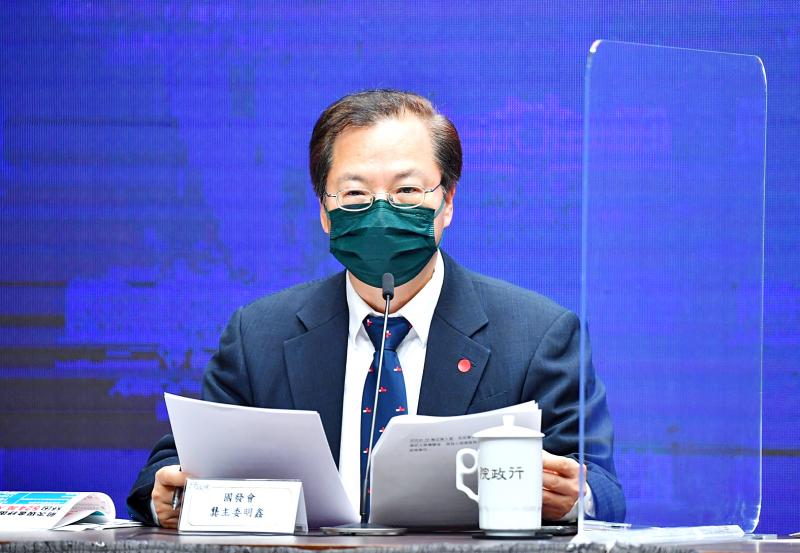The government is planning measures to support local start-ups after a rise in COVID-19 infections in Taiwan, National Development Council Minister Kung Ming-hsin (龔明鑫) said after attending a videoconference with several industry representatives on Friday.
Local start-ups face more difficulties when applying for relief funds or subsidies, as well as when securing credit lines from banks, because they are generally smaller, have not yet started to generate revenue, or their business models or operational schemes do not qualify for relief funds based on current policies, the council said.
SERIOUSLY AFFECTED

Photo courtesy of the Executive Yuan
As a result, start-ups tend to be more seriously affected by the pandemic than other businesses, the council said.
To help start-ups overcome the difficulties, the government is planning to provide more relief funds to struggling start-ups, allow for a more flexible interpretation of financial subsidies for such firms and help start-ups in their investments, the council said.
The council said it held discussions with the management committee of the Executive Yuan’s National Development Fund, the Ministry of Economic Affairs, and representatives from small and medium-sized enterprises to make more start-ups eligible for relief funds, offer them high credit guarantees and provide them with higher loan amounts or more favorable interest rates.
Considering local start-ups’ urgent need for funds, the government would also simplify follow-up administrative procedures for such firms, the council said.
FLEXIBILITY
As the business scope of some start-ups covers multiple industries, which has made it difficult to categorize and qualify them for relief funds, Kung said he has negotiated with the economics ministry and related government agencies to handle start-ups that have been negatively affected by the pandemic in a more flexible manner.
Early last year, when COVID-19 was starting to take hold worldwide, the council presented a special investment option to help local start-ups, offering six to 12 months of funding in exchange for preferred stocks in the firms.
The council would consider whether to continue the investment scheme this year to reduce the financial pressure on local start-ups, Kung said.
The measures are subject to approval by the fund, which is expected to discuss them at a meeting tomorrow.
The videoconference was attended by Taiwan Venture Capital Association chairman Andy Chiu (邱德成), Digital Economy Association Taiwan chairman Jeffrey Wu (吳昕霈), Asia America Multi-Technology Association chief executive officer Jasmine Lin (林蓓茹) and Taiwan Association for Virtual and Augmented Reality chairman Andy Peng (彭子威), as well as the economics ministry’s Department of Commerce Deputy Director-General Chen Mi-shun (陳秘順), among others.
Additional reporting by staff writer

Taiwan Semiconductor Manufacturing Co (TSMC, 台積電), the world’s biggest contract chipmaker, booked its first-ever profit from its Arizona subsidiary in the first half of this year, four years after operations began, a company financial statement showed. Wholly owned by TSMC, the Arizona unit contributed NT$4.52 billion (US$150.1 million) in net profit, compared with a loss of NT$4.34 billion a year earlier, the statement showed. The company attributed the turnaround to strong market demand and high factory utilization. The Arizona unit counts Apple Inc, Nvidia Corp and Advanced Micro Devices Inc among its major customers. The firm’s first fab in Arizona began high-volume production

COLLABORATION: Softbank would supply manufacturing gear to the factory, and a joint venture would make AI data center equipment, Young Liu said Hon Hai Precision Industry Co (鴻海精密) would operate a US factory owned by Softbank Group Corp, setting up what is in the running to be the first manufacturing site in the Japanese company’s US$500 billion Stargate venture with OpenAI and Oracle Corp. Softbank is acquiring Hon Hai’s electric-vehicle plant in Ohio, but the Taiwanese company would continue to run the complex after turning it into an artificial intelligence (AI) server production plant, Hon Hai chairman Young Liu (劉揚偉) said yesterday. Softbank would supply manufacturing gear to the factory, and a joint venture between the two companies would make AI data

The Taiwan Automation Intelligence and Robot Show, which is to be held from Wednesday to Saturday at the Taipei Nangang Exhibition Center, would showcase the latest in artificial intelligence (AI)-driven robotics and automation technologies, the organizer said yesterday. The event would highlight applications in smart manufacturing, as well as information and communications technology, the Taiwan Automation Intelligence and Robotics Association said. More than 1,000 companies are to display innovations in semiconductors, electromechanics, industrial automation and intelligent manufacturing, it said in a news release. Visitors can explore automated guided vehicles, 3D machine vision systems and AI-powered applications at the show, along

AI SERVER DEMAND: ‘Overall industry demand continues to outpace supply and we are expanding capacity to meet it,’ the company’s chief executive officer said Hon Hai Precision Industry Co (鴻海精密) yesterday reported that net profit last quarter rose 27 percent from the same quarter last year on the back of demand for cloud services and high-performance computing products. Net profit surged to NT$44.36 billion (US$1.48 billion) from NT$35.04 billion a year earlier. On a quarterly basis, net profit grew 5 percent from NT$42.1 billion. Earnings per share expanded to NT$3.19 from NT$2.53 a year earlier and NT$3.03 in the first quarter. However, a sharp appreciation of the New Taiwan dollar since early May has weighed on the company’s performance, Hon Hai chief financial officer David Huang (黃德才)